3 de mayo 2020

Children of Exile: The Births “Sowing Hope” in the Camp of Nicaraguan Farmers

PUBLICIDAD 1M
PUBLICIDAD 4D
PUBLICIDAD 5D
While persecuted by the dictatorship, independent journalism’s resistance keeps the flame of press freedom alive as the last reserve of a democracy
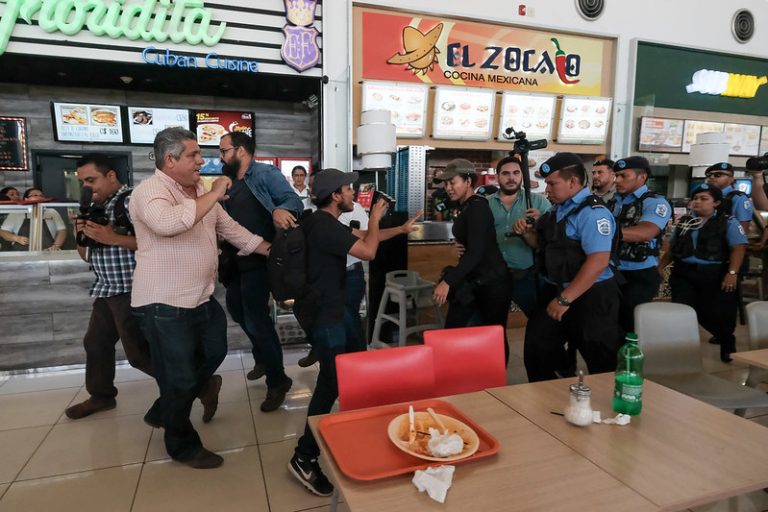
Miguel Mora and Lucia Pineda became symbols of the resistance of the press in Nicaragua
The purpose of these lines is to relate how journalism is carried out in Nicaragua under Daniel Ortega’s dictatorship, and to share the challenges that we journalists face.
A decade before Donald Trump in the US, and Jair Bolsonaro in Brazil appeared on the scene, Daniel Ortega called the independent press, “the enemy” that must be crushed. And long before the era of fake news, Ortega referred to journalists as “Goebbels’ children”, unleashing virulent attack campaigns through official state media in response to accusations of government corruption and abuse of power.
The all-powerful Rosario Murillo, Ortega’s wife and voice of the regime, invented the concept of “uncontaminated information” to refer to the “purity” of official information, which would reach the ears of their supporters free from a filter of uncomfortable questions, contrasting reports and the counterweight of the independent press.
The April Rebellion was accompanied by a transformation of the existing, family-style institutional dictatorship into a bloody dictatorship, accused by international human rights organizations of crimes against humanity, of murdering more than 300 citizens, injuring thousands and propelling 100,000 into exile. The regime, designed to rule without opposition, collapsed when it lost monopolistic control of the streets, and resorted to police and paramilitary violence in order to remain in power.
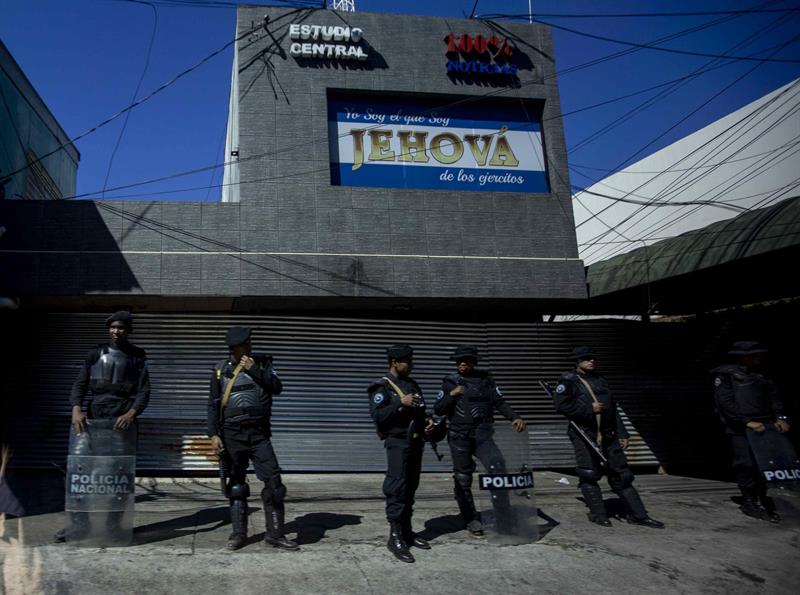
The instalations of 100% Noticias TV have been closed and occupied by the Police since December 2018. Photo: EFE / Confidencial
From the very moment the spontaneous movement threatened the dictatorship’s power, journalists became one of the principal targets of attack by the regime, which sought to muzzle the press and kill the truth. In contrast to other, more prolonged crises, such as the crisis in Venezuela, in Nicaragua, crimes against the press have been concentrated within a period of less than two years and have grown in intensity. According to the Violeta Barrios de Chamorro Foundation, more than 2,100 acts of aggression against journalists and media outlets have been registered during this period, including:
Consequently, journalism is now practiced under conditions of censorship in Nicaragua, at the risk of physical aggression, assault, hounding and harassment by police and paramilitaries. For almost two years, the press in resistance has relied on the courage of reporters and their professional, ethical and political commitment, while reporting the truth at whatever cost.
During the April Rebellion, journalism united around the commitment to the truth in reporting on repression and protests, and a refusal to accept censorship and self-censorship.
The pressure put by journalists on large-audience local media, such as Canal 10 and El Nuevo Diario, which had previously maintained an attitude of complacency regarding the government, was decisive in forcing these outlets to join critical coverage by the independent press.
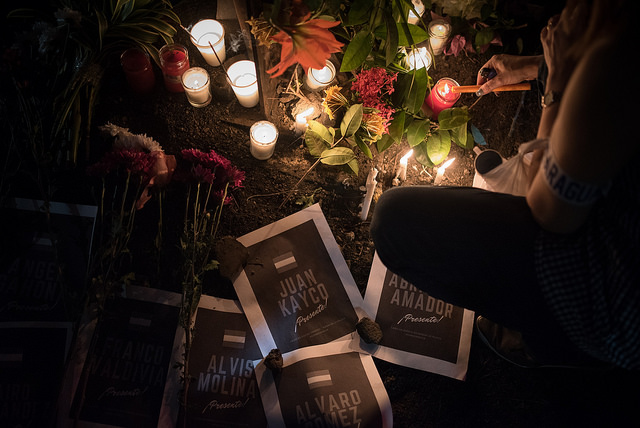
An improvised altar for the victims of the masacre at the Jean Paul Genie roundabout in Managua, Photo: Carlos Herrera / Confidencial.
Our first task was to name the victims of the repression and to tell the story of their murders, which to this day the State continues to negate and hide.
This effort resulted in close collaboration between journalism and human rights organizations that continues today by way of the Mothers of April, a movement created by victims’ families, who demand the truth, and justice without impunity.
In fact, we journalists take the side of the victims of the massacre. Our agenda is one of truth, remembrance, justice and non-repetition, as our ethical commitment to the democratic reconstruction of the country.
In April 2018, the people’s freedom of expression joined the press to report reliable information and the news. The empowerment of the people during the protests and the intense use of cell phones and social networks generated a torrent of information and images without which it would have been impossible to cover the civic insurrection in all its national magnitude.
Our labor as journalists and media outlets is primarily that of professional curator, verifying and putting into context the images and information provided by social media. Almost two years later, social media has become a mirror of national polarization in which opinion, as opposed to information, predominates. This demands an even more rigorous professional effort on the part of journalism.
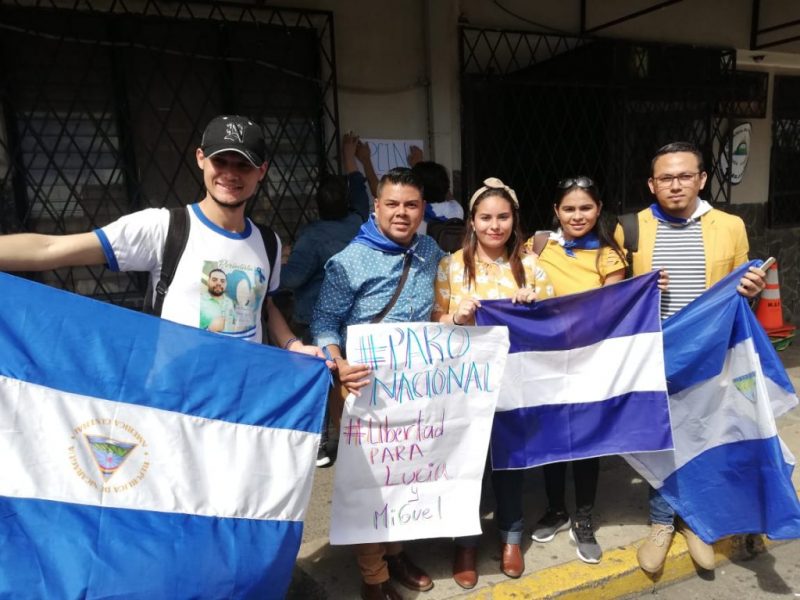
A group of exiled Nicaraguan journalists founded the Nicaragua Actual media in San Jose, Costa Rica.
Under frontal attack by the dictatorship, journalists and the independent news media responded by creating a solidarity network that led to a practice of collaborative journalism. The first collaboration was the formation of the Independent Press Forum, followed by the Journalists and Independent Social Communicators of Nicaragua (known for its Spanish acronym PCIN).
In practice, collaborative journalism arose from journalists’ need for self-protection through collective action to confront police and paramilitary harassment and aggression. The second step was to share sources and even breaking-news scoops to provide greater distribution of the news, to the degree of sharing on digital platforms and radio the content of news outlets suffering from cable and local television censorship, such as Confidencial and 100% Noticias.
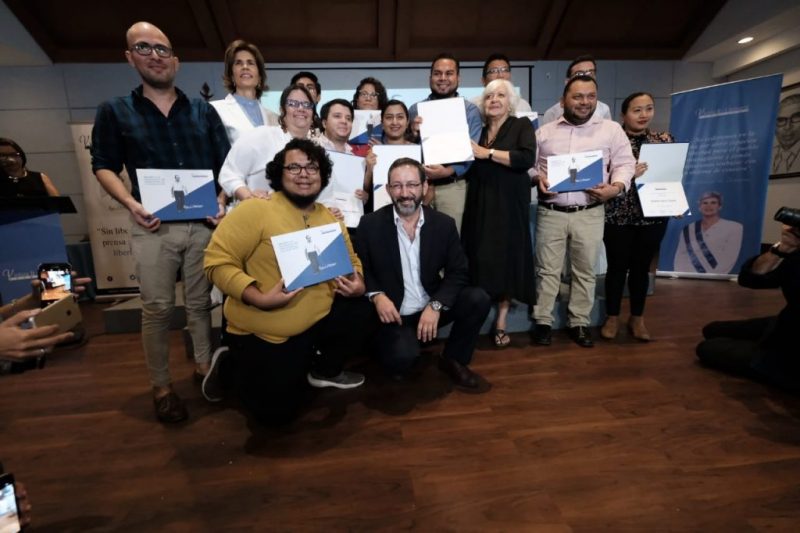
Winners of the XIV Pedro Joaquin Chamorro press awards along with the international jury. Photo: Carlos Herrera / Confidencial
The greatest challenge has been to continue practicing quality investigative and narrative journalism within a climate of extreme political polarization and threats. Journalistic investigations into extra-judicial killings, human rights violations and regime corruption have received awards in national and international competitions and offer irrefutable proof of the quality of the Nicaraguan journalism.
The other aspect of our work is that of monitoring the process of political change which arose out of a self-organized movement, without leaders or organizations. The way in which this movement has become institutionalized, projecting competing agendas and interests, also requires press vigilance. Maintaining the separation between independent journalism and activism, and a certain distance from new political actors is imperative for practicing good journalism and monitoring power.
Under conditions of harassment and persecution, journalism is winning the battle for truth against the official State media’s propaganda and disinformation machine. The stories, testimonies and investigations reported by the independent press regarding State power and the massacre are more convincing than the misleading, official daily monologues of Vice President Rosario Murillo and her discourse of hate, which seeks to justify repressive violence.
In mid-2018, Ortega unsuccessfully tried spreading a narrative of a supposed coup d’état attempting to topple his government, to the extent that he denied the existence of FSLN paramilitary gangs. Yet the official, so-called “normality” has succumbed in the face of the crushing reality of a police state that annulled the right to free assembly and mobilization, reaching the extreme of assaults on churches, religious processions and shopping centers.
When television censorship was imposed, the independent media audience grew exponentially on digital platforms and on social media. New audiences appeared, populated by the youth who had previously kept their distance from public debate, and even numerous party members of the regime who sought independent media as the only alternative for accessing reliable information.
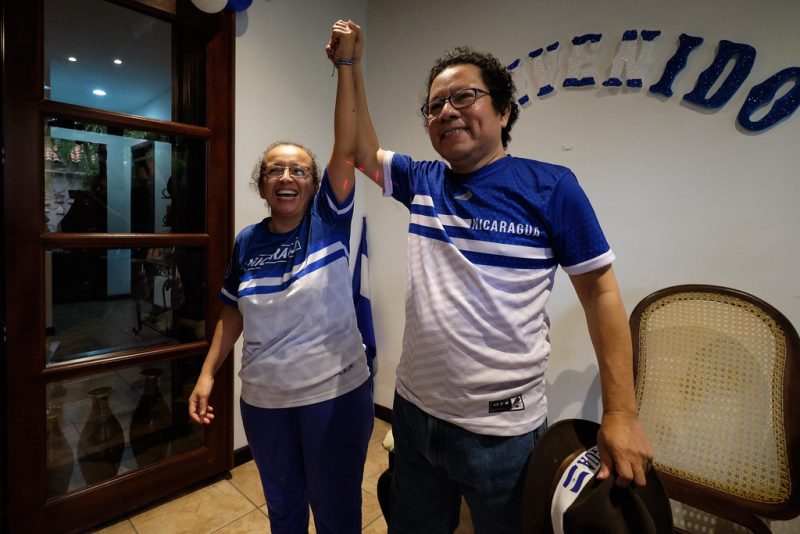
Miguel Mora y Lucía Pineda Ubau, el 11 de junio de 2019, tras su excarcelación después de casi seis meses de prisión ilegal. // Foto: Carlos Herrera
The police assault and occupation of Confidencial and 100% Noticias, in December 2018, forced press resistance into the world of exile and prisons.
The criminalization of journalism sent journalists Miguel Mora and Lucia Pineda, Director and News Director respectively of 100% Noticias, to prison for six months, where they were subjected to a politically motivated trial for supposed crimes of “conspiracy”, “terrorism”, and “inciting hate”. From prison, Miguel Mora and Lucia Pineda became symbols of the Nicaraguan and continental resistance of the press, vindicating journalism as being a non-criminal endeavor.
Between 2018 and 2019, more than 70 journalists were forced to flee into exile as a result of persecution, their homes being besieged and under surveillance, and death threats.
While in exile in Costa Rica, Spain and the US, the Nicaraguan press reinvented itself in digital platforms, in which new media outlets were born, such as Nicaragua Investiga, Nicaragua Actual, Despacho 505, República 18, Actualidad con Dino Andino; while others were reborn, such as 100% Noticias, Esta Semana and Esta Noche, Café con Voz, Jaime Arellano en La Nación, Radio Darío and Voces en Libertad.
Despite suspending the customs embargo against paper and supplies belonging to the daily newspaper La Prensa in February of this year, the regime continues television censorship against 100% Noticias and the programs Esta Semana and Esta Noche, whose offices remain occupied by police since December 2018.
The demand for full restitution of freedom of the press includes the demands for zero tolerance of any and all verbal and physical aggression and intimidation of journalists, the return of Confidencial’s and 100% Noticias’ offices, the safe return of journalists in exile and the lifting of television censorship.
This is the first step in moving toward a political reform that would allow for free elections resulting in an end to the Ortega-Murillo dictatorship and the beginning of national reconstruction.
Journalism is also facing the supreme challenge of maintaining its economic survival and sustainability. In 2020, the country is entering into its third consecutive year of economic recession with a drastic reduction in advertising budgets.
The crisis affecting communications media everywhere, stemming from technological changes within the industry and the digital revolution, is compounded in Nicaragua by additional problems related to a national market in crisis and a dictatorship. The search for new economic management models for financing media independence, through generating revenue, international donations, and contributions from the audience demands involvement that goes beyond the professional interests of journalists. The business sector must also see the survival of an independent press as the democratic imperative of every society.
Lastly, but of no less importance, during a period of tremendous convulsion and regional crisis, we must face our shared responsibility of once again putting the country into the sphere of international public opinion.
The challenge we accept as journalists is to tell the relevant stories about power, in changing a dictatorship through pacific means; stories that create a flash on the radar of the international press, to direct their attention to Nicaragua’s pain, and her hopes.
***
*This text is an updated version of the words of Carlos F. Chamorro, Director of Confidencial and Esta Semana, and member the Directorship Council of Fundación Gabo, during the inauguration of the Latin American Conference on Investigative Journalism 2019 (known in Spanish as COLPIN), organized by the Press and Society Institute (IPYS) in Mexico, November 7th, 2019.
Archivado como:
PUBLICIDAD 3M
Periodista nicaragüense, exiliado en Costa Rica. Fundador y director de Confidencial y Esta Semana. Miembro del Consejo Rector de la Fundación Gabo. Ha sido Knight Fellow en la Universidad de Stanford (1997-1998) y profesor visitante en la Maestría de Periodismo de la Universidad de Berkeley, California (1998-1999). En mayo 2009, obtuvo el Premio a la Libertad de Expresión en Iberoamérica, de Casa América Cataluña (España). En octubre de 2010 recibió el Premio Maria Moors Cabot de la Escuela de Periodismo de la Universidad de Columbia en Nueva York. En 2021 obtuvo el Premio Ortega y Gasset por su trayectoria periodística.
PUBLICIDAD 3D